BGI Genomics 2023 Global State of Colorectal Cancer Awareness Report
2023-04-05
- What more can we do to catch up to this "silent killer"?
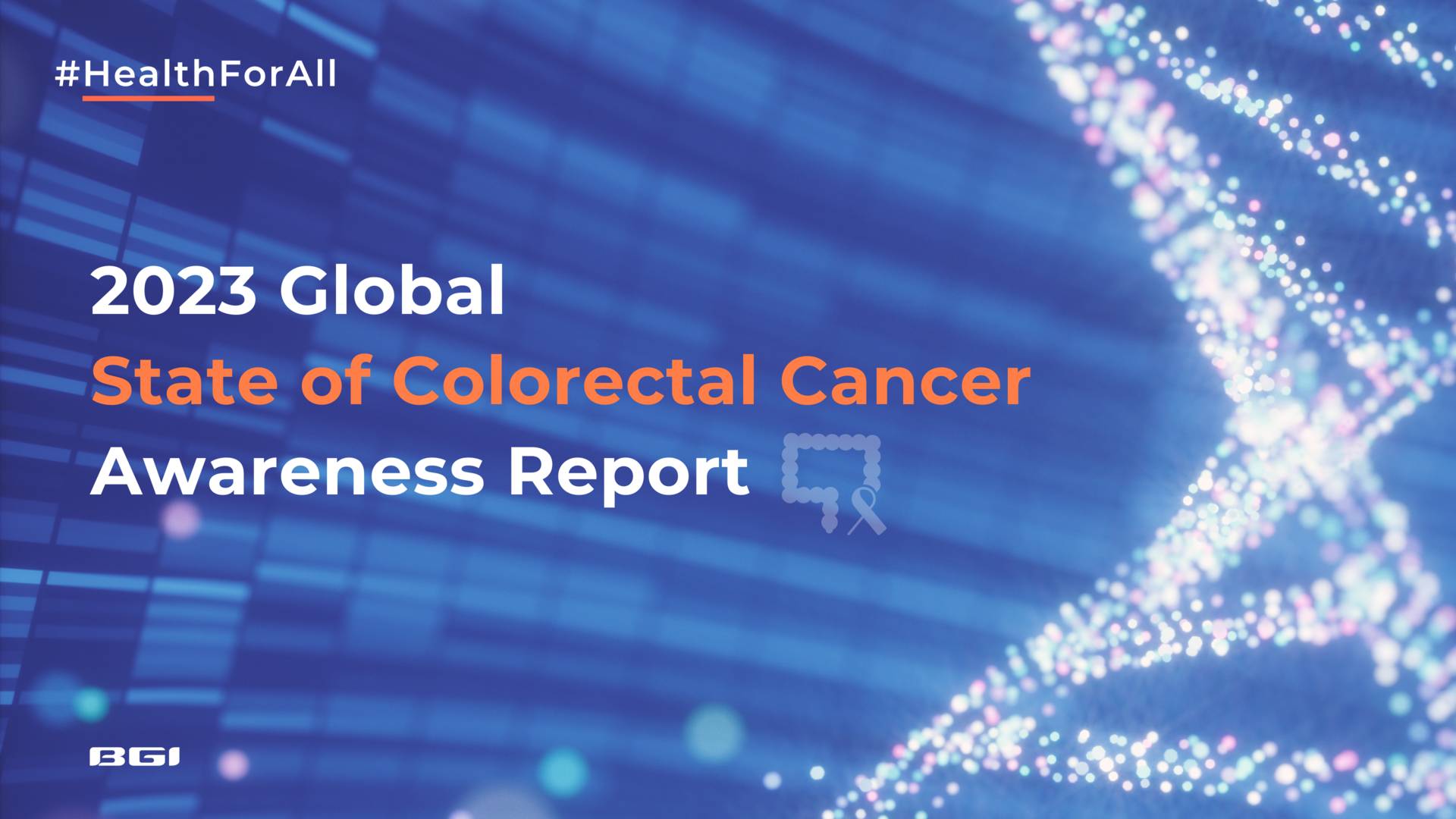
Let's start this first-ever global colorectal cancer (CRC) awareness report with a stark statement: There were over 1.9 million new cases of colorectal cancer in 2020, making it the third most common cancer worldwide.
CRC is often diagnosed at a late stage due to the lack of symptoms – which is why it's often referred to as a "silent killer". When CRC is detected at an early stage, the 5-year relative survival rate is about 90%. But only about 4 out of 10 CRC cases are found at this early stage.
Genetic factors may predispose individuals to CRC, but the majority of CRC cases is largely attributable to risk factors characterized by rising incomes, e.g. obesity, physical inactivity, alcohol and smoking.
As such, the burden of CRC is shifting towards low-income and middle-income countries as incomes grow. In these countries, regular CRC screening is more important than ever before to boost survival rates and control expenses since it takes 10-15 years for cancer to develop.
Recognizing these concerns, BGI Genomics has launched the first-ever global colorectal cancer awareness report, to better understand the global state of CRC awareness, as well as attitudes and actions towards CRC screening for average risk groups and CRC screening for hereditary genetic risk groups.
This study covers 1817 respondents from the U.K, Hungary, Saudi Arabia, Thailand, the Chinese mainland and Hong Kong. Of note, Hungary had the highest overall rate of colorectal cancer in 2020 based on World Cancer Research Fund data.
Here is a summary of our key findings:
- 21.5% more respondents name breast cancer as a top three cancer versus those who mention CRC. The U.K has the largest CRC awareness gap with 72.0%.
- 51.6% feel that there is insufficient information about CRC. In particular, the U.K (68.3%), Hungary (65.7%), and Thailand (62.1%) respondents feel there is insufficient information.
- 54.1% never had a CRC test. Hungarian (68.3%) respondents are most likely to not have taken tests. The most respondents from this country also stated they have insufficient CRC information.
- 69.2% indicate they are aware of colonoscopy as a screening test, ahead of fecal tests (49.5%). Yet, fear of colonoscopy (48.2%) is the top reason holding people back from CRC screening.
- 34.5% cite costs holding them back from CRC screening. Thailand (48.2%) and Hong Kong (46.2%) have most respondents who are concerned about these costs.
- 49.5% have heard about fecal testing. 40.6% of respondents aged between 35-40 years old heard of fecal testing which is the lowest among all age groups.
- 52.5% feel fecal testing is the easiest CRC screening test to administer, followed by colonoscopy (32.4%). The U.K (74.6%) and Hungary (74.3%) have the most respondents who opted for fecal testing.
- 88.8% are more willing to go for screening after learning that early detection of CRC results in a survival rate as high as 90%.
- 62.5% will heed their doctor's advice to undergo CRC screening. Awareness that they fall within the average risk CRC age group (47.6%) is next most common factor.
- 55.7% are aware that a family history of CRC increases their risk. The U.K (68.3%) is the best-informed about the risks associated with CRC family history while Thailand (46.5%) is the least informed.
- 67.2% who had CRC or a family history of CRC have taken their family members for screening. Conversely, only 31.2% of all respondents have taken their family members for CRC screening.
- 35.2% of female respondents have taken their family members for screening relative to 27.3% of male respondents.
This report is organized in three phases: Awareness, Attitudes and actions towards screening for average risk groups, and Attitudes and actions towards screening for hereditary genetic risk groups. We have detailed data and information of our findings below. To better facilitate country or region-specific comparisons, readers may adjust the tables accordingly.
Awareness: What's the impact of a CRC awareness gap?
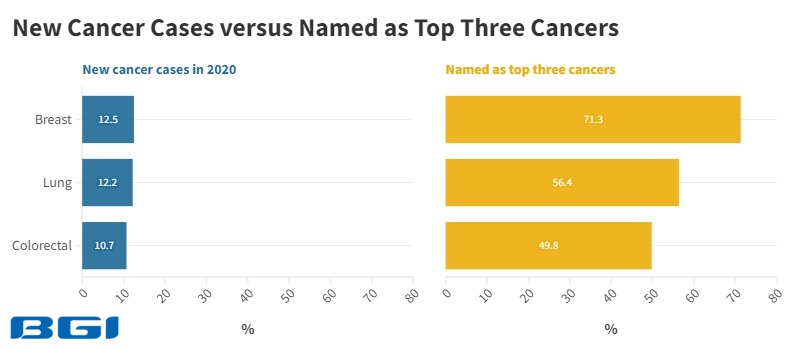
Source: World Cancer Research Fund & BGI Genomics 2023 Global State of Colorectal Cancer Awareness Report
Despite a gap of less than 2% in new breast and colorectal cancer cases, there's a 21.5% gap between those who named breast cancer as a top three cancer versus those who mentioned CRC. The U.K has the largest awareness gap with 72.0%.
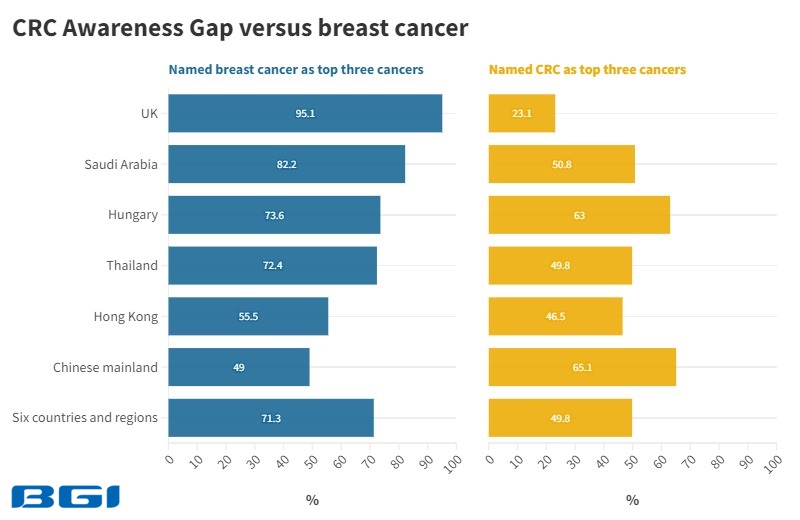
In addition, 51.5% feel that there is insufficient information about CRC, e.g. symptoms, recommended screening age. In particular, the U.K (68.3%), Hungary (65.7%), and Thailand (62.1%) respondents feel there is insufficient information.
54.1% never had a CRC test. Hungarian (68.3%) respondents are most likely to not have taken tests. The most respondents from this country also stated they have insufficient CRC information.
This lack of CRC information may also be linked to respondents who choose not to go for CRC screening. This is particularly worrying as precancerous polyps can detected through regular screening to boost survival rates and reduce expenses. These polyps are the abnormal growth of tissues in the colon or rectum, can take as long as 10-15 years to develop into cancer.
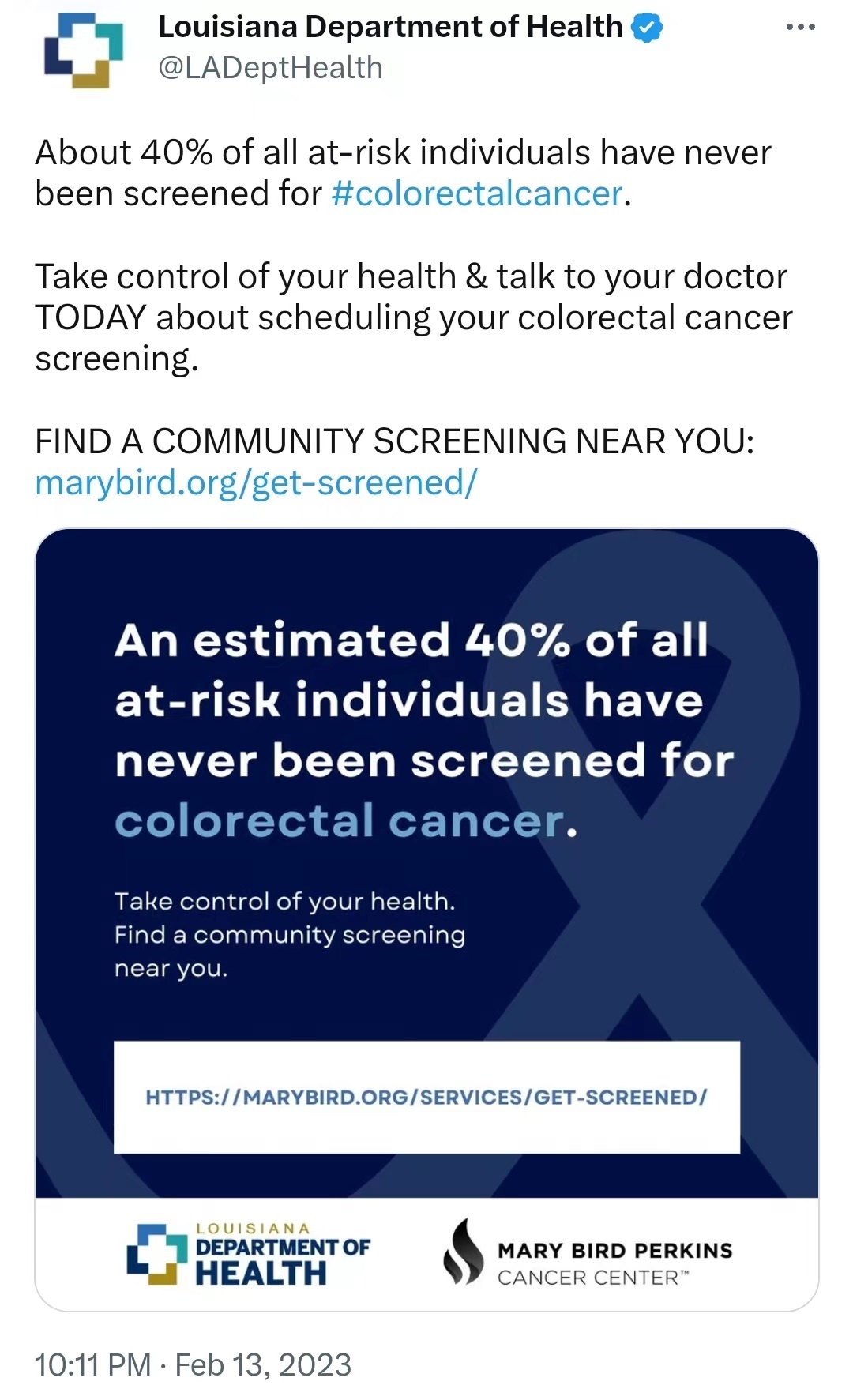
Source: Louisiana Department of Health Twitter Account
Attitudes and actions towards screening for average risk groups: What's holding them back from screening tests?
Fear of colonoscopy (48.2%) is the top reason holding people back from CRC screening, followed by fear of results (41.4%). Chinese mainland shows the highest fear of colonoscopy (56.9%) and results (51.6%).
34.5% cite costs holding people back from CRC screening. Thailand (48.2%) and Hong Kong (46.2%) are most concerned about these costs.
Are there alternatives to colonoscopy?
Fecal testing is a cheaper, more flexible and non-invasive alternative to colonoscopy. Unlike a colonoscopy, these is no dietary restriction or changes of medication required before taking the test.
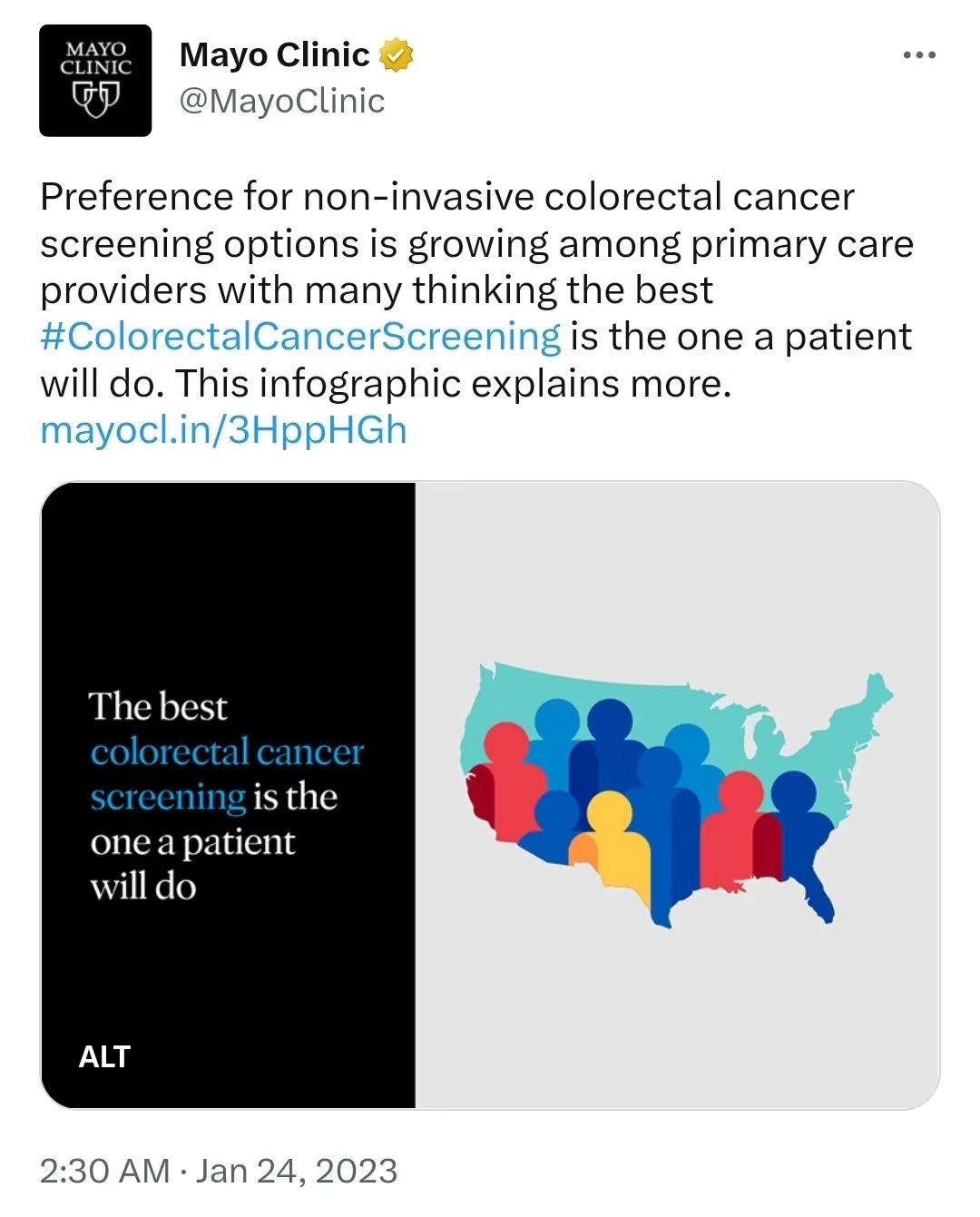
Colonoscopy (68.2%) is the best-known screening test relative to fecal tests (49.5%). 40.6% of respondents aged between 35-40 years old heard about fecal testing which is the lowest among all age groups. This indicates that there is more work to be done among this age group in terms of fecal testing awareness.
52.5% feel fecal testing is the easiest CRC screening test to administer, followed by colonoscopy (32.4%). The U.K (74.6%) and Hungary (74.3%) have the most respondents who opted for fecal testing. In countries where there's a higher recognition of the advantages of fecal testing, there's more likely to be an enhanced take-up with greater affordability of these tests.
What's likely to encourage people to undergo CRC screening?
Most convincing reason: Higher survival rates associated with earlier detection. 88.8% are more willing to go for screening after learning that early detection of CRC results in a 5-year relative survival rate of 90%. But only about 4 out of 10 CRC cases are found at this early stage.
Doctor's advice and self-awareness play an important role as well. 62.5% will heed their doctor's advice to undergo CRC screening. Awareness that respondents fall within the average risk CRC age group (47.6%) is next most common reason.Attitudes and actions towards screening for hereditary risk groups: Are they making informed choices to manage their risks?
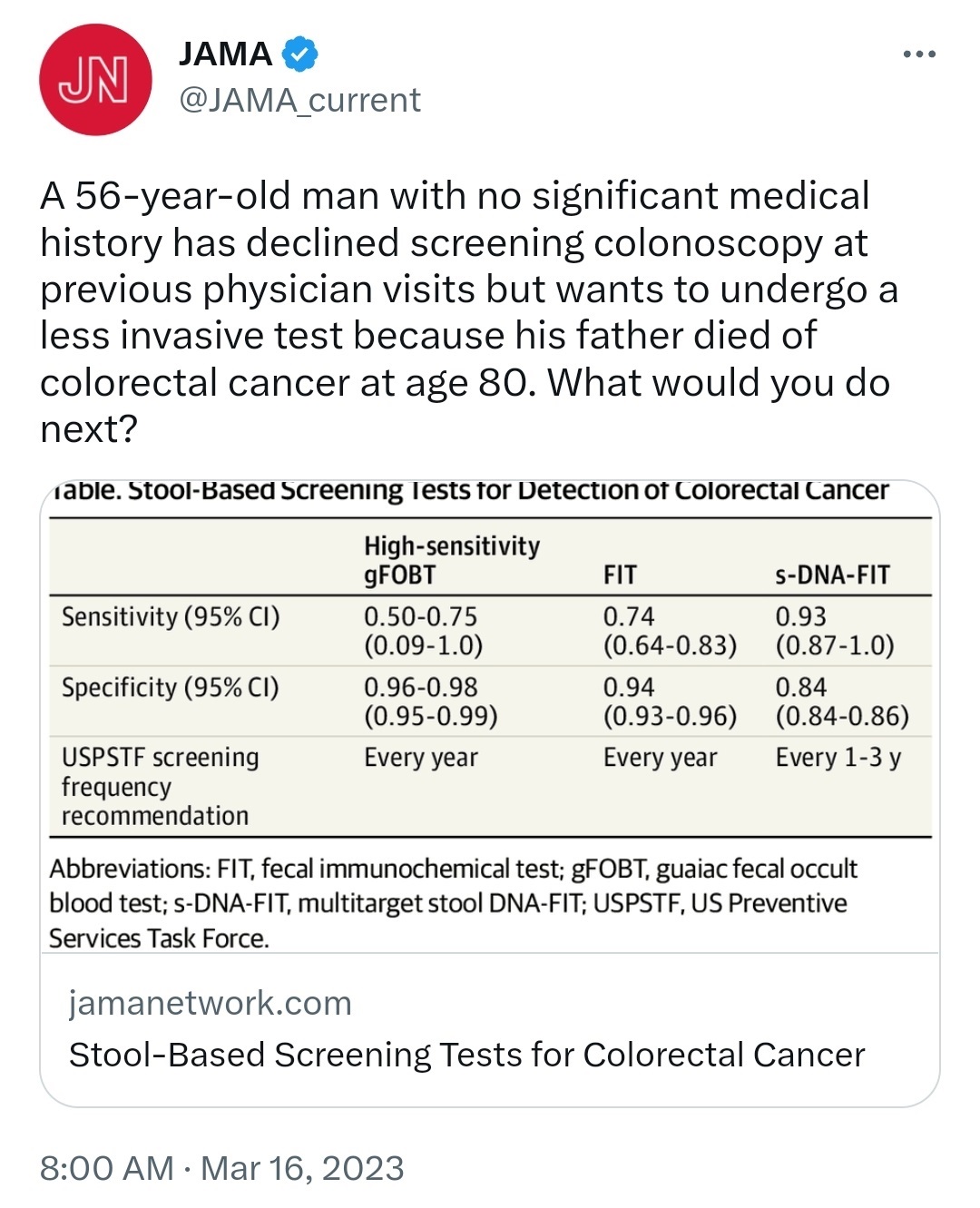
Female rather than male respondents are more likely to take their family members for CRC screening. 35.2% of female respondents have done so relative to 27.3% of male respondents.
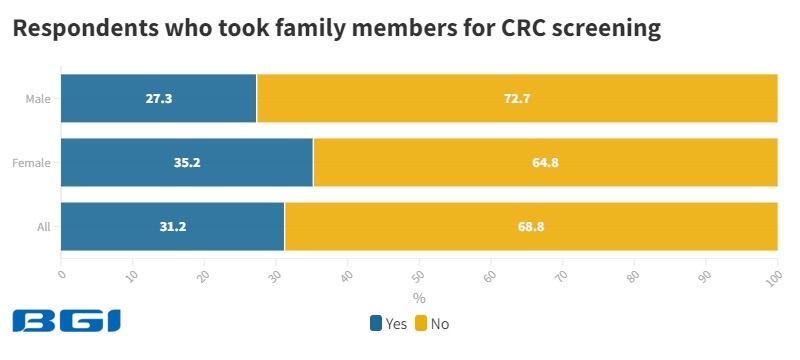
Concluding Remarks
This report indicates that catching up to the global CRC "silent killer" requires a three-pronged approach:- Enhancing general awareness: 51.5% feel that there is insufficient information about CRC. General awareness campaigns should include CRC symptoms, recommended screening age, a range of screening options including colonoscopy and fecal tests. The 5-year survival rate of 90% for early CRC detection is also worth highlighting since 88.8% are more willing to go for screening after learning about this.
- Enhancing affordability: 34.5% cite costs holding them back from CRC screening. Though colonoscopy (68.2%) is the best-known screening test, it is more expensive and cumbersome relative to fecal testing which is lesser known at 49.5%. To promote this more affordable option, we must first enhance fecal testing awareness.
- Enhancing doctor's awareness: 62.5% will heed their doctor's advice to undergo CRC screening. Therefore, it is vital that doctors are made more aware of CRC symptoms, ask the right questions to identify potential hereditary genetic risk and offer patients a range of screening options, to fit different lifestyles and budgets. In our (and The Mayo Clinic's) opinion, the best colorectal cancer screening test is the one a patient will do.
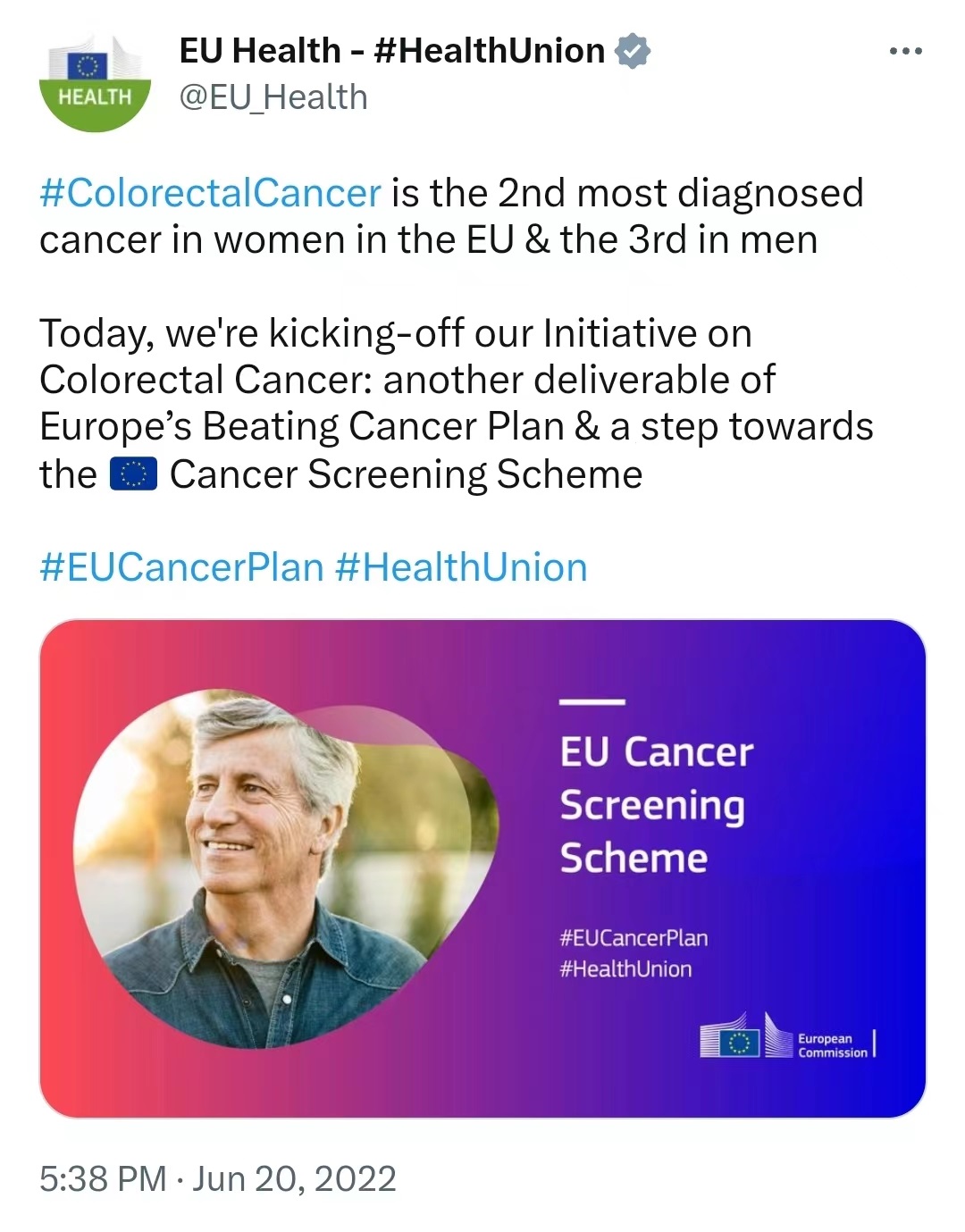
Source: EU Health Twitter Account
About BGI Genomics and COLOTECT
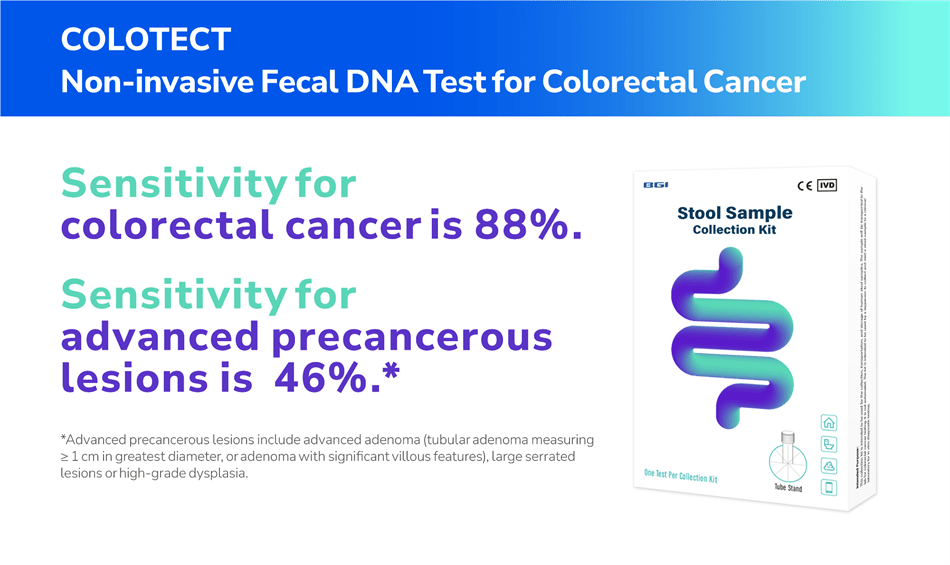
Methodology
This study was based on an online survey of 1817 respondents from the U.K (303), Hungary (303), Saudi Arabia (303), Thailand (301), Chinese mainland (304) and Hong Kong (301).These respondents were based in their respective country or region when this survey was conducted in February 2023. Survey forms in the respective local languages were sent. Respondents were aged between 35 to 75 years old with 50:50 male to female sex ratio. This survey was carried out by Momentive Global.
Read More:
2023 Global State of Thalassemia Awareness Report
2023 Global State of Cervical Cancer Awareness Report